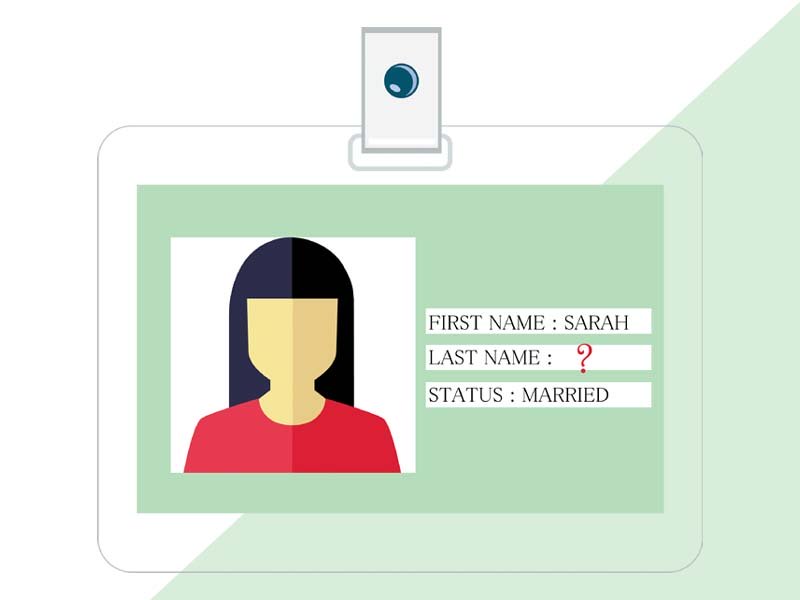
The post-marriage surname change is perhaps one of the most significant wedding rituals, almost like a rite of passage of sorts. It is something women are simply conditioned to do, without giving a second thought. But times are now changing. Over the past few years, more and more modern women have started to unpack the norm, questioning its religious and cultural significance. After all, it is a matter of personal choice, right?
Wrong! Unfortunately, most women in Pakistan adhere to the practice because they are under the misconception that their religion requires it, when in fact, it has absolutely no religious basis. On the contrary, most religious authorities argue the merits of retaining the maiden name so as to preserve a woman’s lineage and identity, which stems from her father and not her husband. Therefore, if we follow the right contexts, it is obvious that rendering the name change as necessary and reluctance to do it as haram, is incorrect and extreme, one way or another.
Religion aside, there is immense pressure on women to adopt her husband’s name from a cultural point of view. “I briefly considered keeping my maiden name after marriage but the idea was not met very positively by my family,” says 25-year-old Aisha Nadeem whose parents felt that this would make Aisha seem ‘overly progressive’ and ‘not willing to commit’ to her in-laws. There was also some superstition attached to their ideology as her grandmother claimed that retaining Aisha’s maiden name would bring misfortune to the marriage. “I didn’t believe any of this but had to comply,” adds Aisha.
Unsurprisingly, several women willingly go along with the practice for reasons other than the fear of society and in-laws. A common reasoning is the issue of practicality when it comes to starting a family as the children bear the father’s name and their mother, ideally, should also. Some women even claim that their new name sounds better, especially true in cases wherein the in-laws hail from the social elite. For these women, adopting the family name becomes a source of pride. At the other end of the spectrum are women like 30-year-old Sobia Ali who find the name change to be romantic. “I have always felt like when the wife changes her name and attaches it to her husband’s, it makes him happy,” says Sobia. “Whether others find it romantic or simply a chauvinistic practice, I don’t know. But I feel that changing my name brought me closer to my spouse.”
According to Diana Boxer, a linguistics professor at the University of Florida, the decision of changing the surname reflects male dominance through society. After conducting a series of studies on the practice in 2005, Diana concluded that, “Understanding naming traditions is important because they give clues about underlying social patterns and shifts in attitudes about the expected roles of women.” She also suggested that people have a blasé attitude and question what’s in a name when in fact, there is a lot more to it. “Linguistics symbols tell us how people are treated in society,” she adds.
Resulting from Diana’s research, there has also been a wave of feminists discouraging women from changing their names as it usurps them off their identities. For feminists, this signals women’s submission to their husbands and reinforces the idea that women are inferior to men. “When women change their surnames, they reinforce the idea that their identity is only dependent on that of a man,” declares 23-year-old Anaya Fahd. This in return feeds into the idea that a woman can only be known relationally to a man, defined as someone’s wife, sister, daughter or mother. “Agreed that the maiden name is also derived from the father but by choosing to keep it after marriage, I proactively took a stand to preserve the identity that I had for the past 23 years instead of giving it up to please society,” she adds.
For 38-year-old gynaecologist Aleena Malik, there was much more than feminism that dissuaded her from acquiring a new name post-marriage. “I didn’t want to go through the long process of changing all my legal documents and identification papers, simply because society expected me to,” says Aleena, adding that it could have compromised her professional success. “Ex-colleagues or classmates, or perhaps recruitment companies searching for me on social networks by my maiden name would have never found me,” she adds. Another grave concern is what becomes of a woman’s name in the event of a divorce. For 35-year-old Sabeen Muzaffar, it was very impractical and emotionally taxing to have to get all her legal documents edited back to her maiden name, following her divorce from her first husband. Many women believe that giving at least some thought to divorce when getting married is advisable as it only helps ease the emotional trauma in case there is one.
Whether a woman chooses to maintain, change or hyphenate her name after getting married is a completely personal matter and no one should have the right to make this decision for her. Nonetheless, it is interesting to see alternative practices emerging in Pakistani society, even if it is questioning a practice that has been followed blindly for centuries.
Mehreen Ovais is an alumna of Manchester Business School and Lahore University of Management Sciences. She is passionate about writing and journalism. She tweets as @mehreenovais
Published in The Express Tribune, Ms T, May 17th, 2015.

1725882931-0/Tribune-Pic-(7)1725882931-0-165x106.webp)
1731756268-0/BeFunky-collage-(9)1731756268-0-165x106.webp)

1726728390-0/BeFunky-collage-(7)1726728390-0-165x106.webp)












COMMENTS (1)
Comments are moderated and generally will be posted if they are on-topic and not abusive.
For more information, please see our Comments FAQ